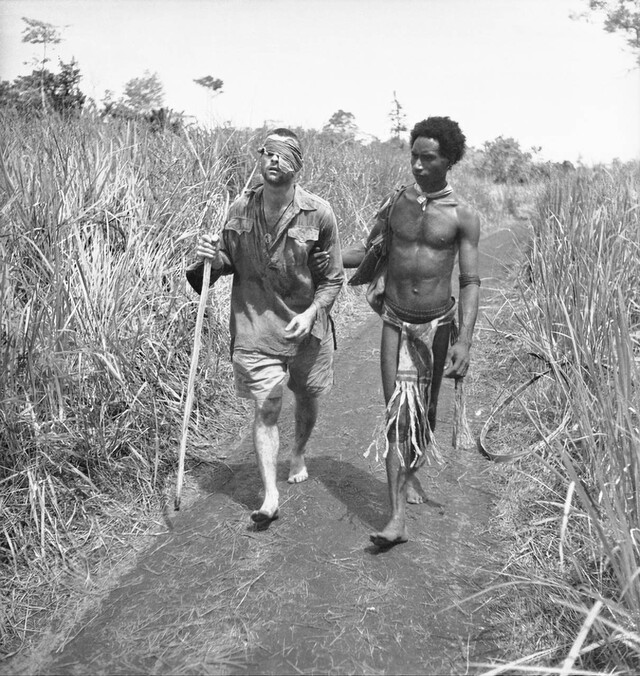
It was way back in a 1927 issue of The Printers Ink, that an advertising executive, named Fred R Barnard, is reputed to have written that famous quote, “ A picture is worth a thousand words.” When my father in the early 1950s, handed me a copy of the Brisbane Courier Mail, I at 12 yrs. of age, suddenly began to understand the power of these words. I sat stunned at what I saw.
It showed a photo of a wounded digger named Private George Whittington, walking from the Kokoda Track with the aid of a walking stick. He was bare footed, no hat and had both eyes bandaged. But the thing that really caught my eye, was the native that was supporting him. Walking on his left and holding his arm in support, was a native with the biggest head of hair I had ever seen.
In answer to my youthful question, “Hey dad look at all his hair, who is he”? My father, a New Guinea veteran, answered, “That my son, is Raphael Oimbari, and he is one of those famous New Guinea natives that us diggers called, the Fuzzy Wuzzy Angels.’’
With that he handed me a paper cutting, and told me in no uncertain terms, that I was to read it. After further discussion I started to understand why, that when he spoke, he spoke with such respect. The cutting was a copy of that now famous poem, the Fuzzy Wuzzy Angels.
The author, was Canadian born, Sapper H E “Bert” Beros of the 7Div RAE AIF: and the poem was written, while camping at Dump 66, on the First Range of the Owen Stanley Track. Beros, then later on dedicated the poem to the memory of his mate, Sapper Victor Cook 2/22nd Field Coy. RAE. The dedication, had eventually come about, after Beros was to overhear a remark made by his mate, while helping the carriers get the wounded diggers off of Iababia Ridge. Sapper Victor Cook was reputed to have said, “There will be a lot of black angels in heaven after this.’’ Boris had obviously taken the words to heart. Thus, the dedication.
By 14 October 1942 the poem had come into being: appearing in the Courier Mail 31 October. It was not submitted by Boris, but by the mother of a digger, whose son had given her a copy. Boris was not named as the author. It was not until the poem appeared in the 9th January 1943 edition of the Australians Women’s Weekly, that Bert Beros became known as the author.
Beros, who had been something of a poet for some time, had written a lot of his verses while on troop ships in the Middle East and other places as well as New Guinea. Some of his themes are very moving: referring of course to mothers and nurses.
In the words of Stuart Inder, (a journalist who had joined the Australian army as a journalist, in the late 1940s, and had specialized in news and current events of Papua New Guinea) “Lets recall what Bert really wrote in Fuzzy Wuzzy Angels.’’ Despite having read the poem many times during the passing years, it never fails to move me.
In my home town of Gympie, I know that there are veterans who owe so much to these men. Here now, is a copy of the poem that swept a nation.
Fuzzy Wuzzy Angels
Many a mother in Australia,
When the busy day is done,
Sends a prayer to the Almighty
For the keeping of her son,
Asking that an angel guide him
And bring him safely back-
Now we see those prayers are answered
On the Owen Stanley Track.
For they haven’t any halos,
Only holes slashed in their ears,
And their faces worked by tattoos,
With scratch pins in their hair.
Bringing back the badly wounded
Just as steady as a hearse,
Using leaves to keep the rain off
And as gentle as a nurse,
Slow and careful in bad places
On that awful mountain track,
The look upon their faces
Would make you think– that Christ was black.
Not a word to hurt the wounded,
As they treat him like a saint;
It’s a picture worth recording,
That an artist’s yet to paint.
Many a lad will see his mother,
And husbands, wee’uns and wives,
Just because those fuzzy wuzzies
Carried them to save their lives
From mortar bombs, machine- gun fire,
Or a chance surprise attack,
To safety and care of doctors
At the bottom of the track.
May the mothers of Australia,
When they offer a prayer,
Mention those impromptu angels,
With the fuzzy wuzzy hair.
LEST- WE FORGET.






